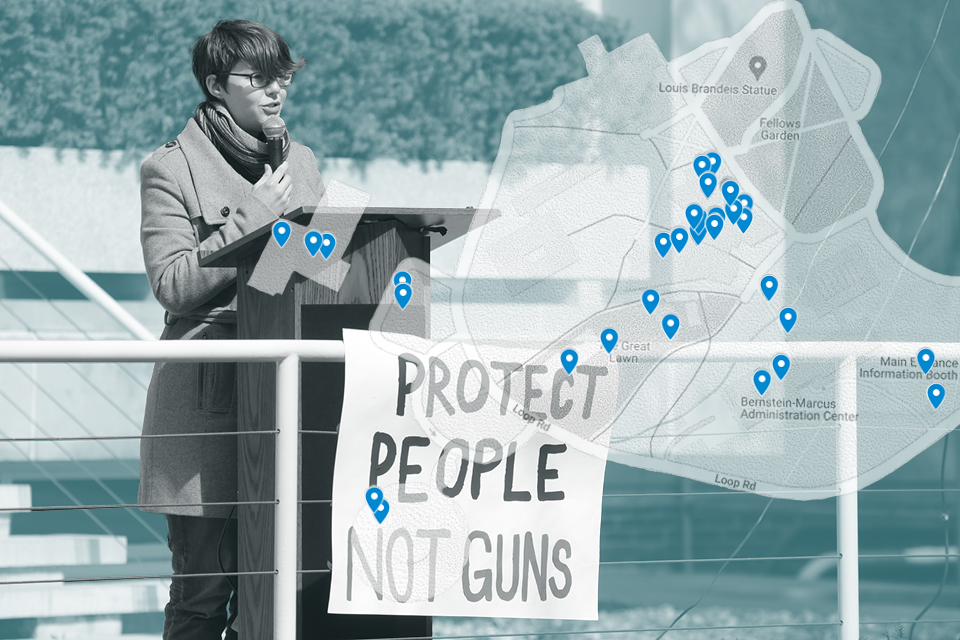Social movements - close to home
 Illustration/Jessica Tanny. Photo/Mike Lovett
Illustration/Jessica Tanny. Photo/Mike LovettA student speaks at a 2018 rally outside the Rose Art Museum.
When the pandemic pulled so many students away from Brandeis last year, assistant professor of sociology Gowri Vijayakumar retooled her annual “Social Movements” class to reconnect them to the geography of campus through its history of protest.
The course combines research into the histories and sociology of social movements with activist interviews. This year, students examined how and where activism has left a mark on campus.
“A lot of the students had encountered stories about social movements at Brandeis, but they hadn’t experienced it through primary sources,” said Vijayakumar. Library and archives staff members Maric Kramer and Chloe Gerson assembled archived student newspaper articles, opinion pieces written by activists, local news coverage, and preserved photographs and artifacts for students to examine digitally.
At a time when the class had to be held remotely, Vijayakumar said it felt important to ground the research in a specific physical place, and she encouraged students to walk around and take in the key locations of the areas where activism happened on campus. Ultimately, they located the sites of different protests and activities on Google Maps as part of their coursework.
She said the original Ford Hall protest in 1969 was the class’s starting point, and students learned about Ford Hall 2015 from a guest speaker, Aja Antoine ’17. From there, students began their own research and looked at Ford Hall as well as other movements including Take Back the Night marches, anti-war activism, protests against a demonstration by the Westboro Baptist Church, and disability justice activism.
Jonah Nguyen ’21had been active in Boston’s LGBTQ community, but hadn’t considered activism through a scholarly lens before enrolling in Vijayakumar’s class.
“This class really opened my eyes,” he said. “I learned there are many ways to be activists - it’s not just going to a rally or a celebration.”
Politics and Philosophy major Kurtis Lee ’22, looked at two student protests occurring at Brandeis in 2015, when the Ford Hall 2015 protest took place, at the same time the Brandeis Asian American Task Force (BAATF) was pressing for more Asian American historical and cultural representation in the curriculum.
Lee examined the points of contact and cooperation between #StillConcernedStudents, who led the Ford Hall 2015 protest, and the BAATF. The BAATF delayed the submission of a petition to the administration until the Ford Hall 2015 protest ended, Lee said, in order to show solidarity and support.
“I believe that the solidarity and coalition shown between the two organizations are instrumental to each other’s eventual success. Without this mutual cooperation, neither movement would have been as effective,” he wrote in his paper about the two organizations.
Alaina Vermilya ’24 researched a rally in front of the Rose Art Museum in 2018 by Brandeis Never Again, an anti-gun violence group. The rally, which took place on April 20, 2018 — 19 years to the day of the Columbine, Colorado high school shootings, and about six weeks after the shootings at the Marjorie Stoneman Douglas High School in Parkland, Florida, which launched a new wave of young people’s activism against gun violence.
Vermilya, who now plans to major in sociology, became especially interested in how students organized the protest through different means, working through Community Advisors as well as the Student Union.
“I was also very moved by how different activism can look for different people,” she said, adding that “I try to focus less on whether I identify with the word `activist’ and more on the impact of our work on communities.”
Vijayakumar said that while she was glad the class will be held in-person this year, she hoped to maintain some of the advantages the digital platform offered, like the opportunity to Zoom in guest speakers across the country to talk about social movements, including farmers’ protests in India, #SayHerName on Twitter, and domestic worker and undocumented student activism in Massachusetts.
“I might use more digital tools in the classroom,” as a result of the past years’ experience, she said.
Categories: Humanities and Social Sciences, Research, Student Life





